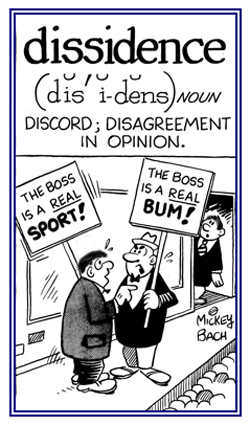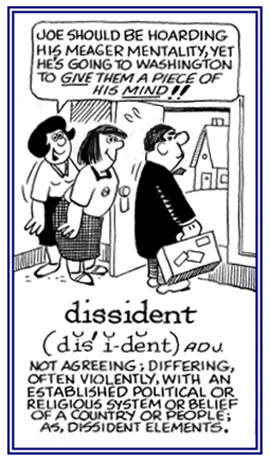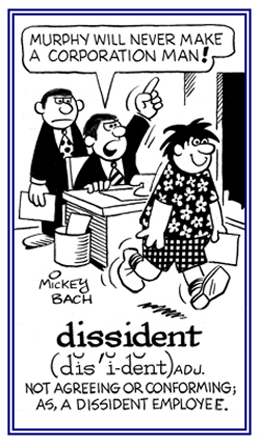dis-, di-, dif-
(Latin: separation, apart, asunder; removal, away, from; negation, deprivation, undoing, reversal, utterly, completely; in different directions)
The meaning of dis- varies with different words; dif-, assimilated form of dis- before f; di-, form of dis- before b, d, g, l, m, n, r, and v.
2. Resembling a dissertation.
"Do you think he will disserve you again?"
2. To do something that makes the opinions of people about someone or something not to be as good as it should be: "To describe her as merely a journalist is to do her a disservice."
"She did a great disservice to the professionals at the day-care center when she referred to them as 'babysitters'."
"Calling her lazy and uncaring does the nurse a great disservice."
3. An action that is intended to help others but which turns out badly: "He did a disservice to readers by providing the wrong information even though he sincerely thought he was doing the right thing."
Go to this Word A Day Revisited Index
so you can see more of Mickey Bach's cartoons.
A judge ordered that dissident Kim Davis should remain in jail for her continued refusal to either issue marriage licenses to same-sex couples or to allow her deputies to do it.
There were also three other dissident clerks in Kentucky who have refused to issue wedding licenses; despite the U.S. Supreme Court’s order legalizing same-sex matrimony.


Go to this Word A Day Revisited Index
so you can see more of Mickey Bach's cartoons.
In totalitarian regimes, dissidents are often punished with lengthy prison terms, execution, economic deprivation, or confiscation of their property.
2. A person who is characterized by departing from accepted beliefs or standards: Political dissidents primarily use non-violent means of political disagreement, including voicing criticism of the government or a dominating ideology; but dissidents can also attempt to displace or overthrow the established government by achieving popular support and inciting a revolution or a rebellion.3. Etymology: From Latin dissidentem and dissidere, "to be remote, to disagree, to be removed from"; "to sit apart"; derived from dis-, "apart" + sedere, "to sit".
3. Relating to anyone who disagrees; especially, with a majority.
2. Characteristic of being different.
2. A point of difference or distinction.


